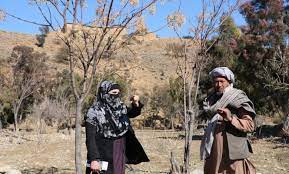Journalism is a tough profession for women in Pakistan in general and Khyber Pakhtunkhwa in particular. Women reporters besides journalism also have brave society and its stereotypes; however, many a women journalists are making their mark in the field despite these hurdles.
Razia Mehsud, a female journalist from Ladha area of South Waziristan is one such example. She said that the plight of women during military operations in the war on terror motivated her to join journalism. “Women were among the worst affected among those displaced due to operations,” she said. She said that women used to narrate stories of their horrifying ordeals to each other. Many a women had fallen prey to explosive devices while many others have walk on foot without eating anything.
Razia said that international media only used to report about incidents of terrorism and the stories of those affected by locals was nowhere. “Women living in tents were facing many issues and no one was talking about them,” she said.
She said that this forced her to start reporting, which was difficult task for her to do in the absence of a platform. “I applied for a job advertised by the Tribal News Network (TNN) which provided mobile journalism training before I started reporting,” Razia said.
Besides, she said that it was nearly impossible to work in field; however, she took it as a challenge. “Someone has to join the field and raise voice for women,” she said.
Razia said that it was nearly impossible for women to work as journalist in South Waziristan. “Majority of people think that women only belong inside a house and out of home they can only work in education and health,” Razia said.
She said that she braved public criticism for about two years and she was incessantly harassed online and made subject of smear campaigns, which forced her in-laws to ask her to quit journalism.
“It was really tough time for me,” he said.
However, she said that when locals saw her work it changed their mind and now the same people tell her that they were really proud of her work.
“I am in the field since 2016 and one cannot grow without braving difficulties,” she said.
Razia said that in the start she sometime lost heart when family told her that they cannot face the public criticism.
Besides, she said that initially she was not allowed to go into field and whenever she went people gathered there and looked at her contemptuously.
“I was very satisfied with my work and there are many issues on which people should speak; however, they fear coming on media,” she said.
Razia said that journalism in tribal areas is difficult job in the absence of transport and internet while security issues are in addition to this.
However, she said that people thinking is changing as compared to 2016 as many people are positive about allowing women to work in media.
“Waziristan women are coming forward and this is really a proud moment for me and it is giving me immense satisfaction,” she said.
She said that merged areas women can make their mark in every field.
Jamaima Afridi, a freelance journalist from Khyber said that she was contributing to several outlets including TNN, Voice.Pk, The Friday Times and other organizations.
She said that a women journalist faced problems both in real life as well online. “For women in merged areas it was next to impossible to appear on TV screen; however, I consider myself fortunate,” she said.
Jamiama said that initially she faced problems both from public as well professional. “The public views and criticism of women causes immense strain on women; however, gradually one makes her peace with all this,” she said.
Jamiama said that she won an award for her work on religious freedoms and also won accolades for constructive journalism. Besides, she was also among the six finalists for UK based Young Journalists Awards.
Pakistan Federal Union of Journalists acting president Shamim Shahid said that lack of interest of media organization was responsible for less representation of women in journalism in KP.
Shamim said that there were few media organizations in KP and majority were focused on Islamabad and Punjab.
Besides, he said that many a female graduates of journalism start teaching after education or join some other profession due to difficulties of professional journalism. “it is difficult for women to venture into remote areas,” he said. However, he added that the entry of tribal women into journalism was a positive step.
“Tribal areas are facing militancy and extremism for past 50 years and when males have been forced to leave the area, then how women were supposed to work as reporters,” he questioned.
To increase the number of women journalists, Shamim said that the media organizations have to pay attention to KP. “If private organizations cannot open offices here, then, at least they can do programmes on the region issues,” he said.
He said that they were working to ensure protection of journalists; however, added that government role was imperative in this regard.
KP Information department spokesperson Ansar Khilji said that his department has always been at the forefront of efforts to facilitate the journalists.
Besides, he said that they have also launched welfare schemes for media workers and gave health fees amounting to Rs 100,000, shuhada package worth Rs 1 million, media colonies, marriages grants and media tours.
Ansar said that these facilities were being provided without discrimination of gender.
Regarding the social barriers, he said that press clubs and unions were better platforms to deal such issues. “As far as information department is concerned there is discrimination is made on the basis of gender,” he said.
He said that women journalist were also equally eligible for benefits being availed by their male counterparts.
Source: TNN Network


